Lost Top Fives, Part 4
With the strike-induced hiatus causing massive withdrawals in fanatics of ABC's hit show Lost, I find my mind constantly dwelling on the show. For this reason, I've decided that I shall spend this week on a new set of top fives, all centered around Lost. Before I get right on into it, though, know that there are massive spoilers in store for you if you haven't been keeping up with the show. So, without further ado, here are my top fives for Lost.
Top 5 Most Underwhelming Episodes
Even a show as mind-bogglingly well-made as Lost has a bad apple or two (or five) in its colorful history. Sometimes, these episodes move at a snail’s pace, reveal nothing about the mysteries of the island or the characters who inhabit it, or are just plain nonsensical. Keep in mind, though, that the worst episode of Lost is still damn fine television.
"One of Us"
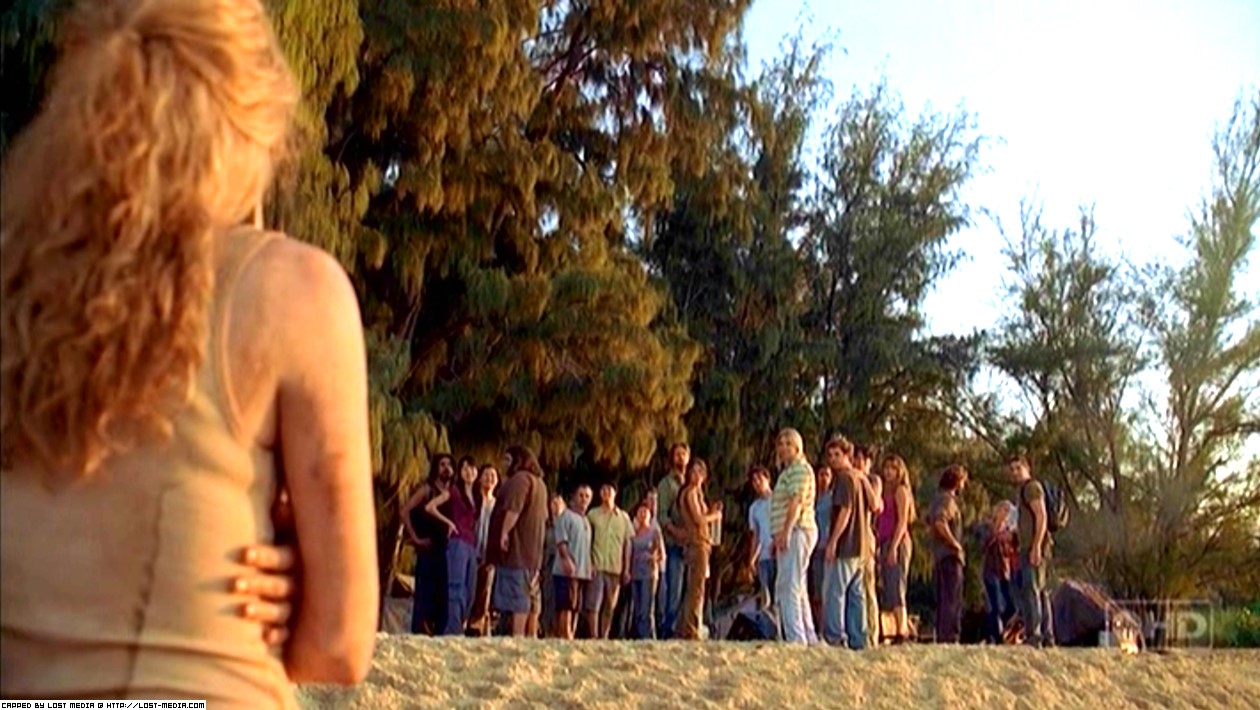 | | Not the warmest of welcomes... |
Though I listed Juliet in my list of least favorite characters, I have to confess that her flashbacks in the third season episode “One of Us” aren’t that bad. Picking up where her flashbacks in “Not in Portland” left off, we follow Juliet to the island, learn that she had a sexual relationship with Goodwin, and see how she’s been manipulated into staying on the island for so long. We also see that she may still be working for Ben, despite all he’s done to her.
It’s the main story of the episode, though, that falls flat for me. Jack has just returned to the beach camp, and acts unnecessarily shady. Baby Aaron gets sick, and the explanation for it—that the others planted something in the baby that could be remotely triggered so that Juliet could be a hero—makes no sense in light of the fact that the others never intended to give Aaron and Claire back when they originally kidnapped them in season one. It’s convenient and illogical storytelling, and that always irks the snot out of me.
Sawyer and Sayid are not fooled, however, and go to confront Juliet. Juliet gets out of the confrontation by spouting out facts about Sawyer and Sayid’s shady pasts, and Sawyer and Sayid are dumbstruck and let her go, something neither Sawyer nor Sayid would ever do. Not only is Sayid’s past in Basra unexplained, but it is also never explained how the others know about Sawyer killing Frank Duckett or why they seem to think he did it the night before leaving Sydney (if you follow the timeline shown in season one, it is impossible for Sawyer to have shot Frank the day before his deportation).
What’s worse, though, is it is never explained how or why Juliet knows all this. It makes sense that she’d study up on Jack, whom she was charged with interrogating earlier in the season, but why she would know anything about Sayid or Sawyer is beyond my ability to hypothesize—Juliet’s simply not that important in the others’ heirarchy. At least when Mikhail confronted some of the losties earlier in the season and seemed to know everything about them, it made sense, as Mikhail was apparently the main background researcher charged with building the files on all the losties. But Juliet’s job in the others is as a fertility doctor!
"Abandoned"
 | | "You think your life is bad, cursed fat guy whose friends and family keep dying? I lost my ballet internship!" |
Another character I’ve already admitted to disliking is Shannon, and her flashback episode, “Abandoned,” asks us to sympathize with her. Yes, it’s sad that her father dies in a sudden car accident, and yes, her stepmother is an unsupportive bitch. However, it is clear that Shannon is spoiled, whiny, and immoral, so sympathizing with her is difficult.
The main story of the episode chronicles her sex with Sayid, visions of Walt, and bitching that nobody takes her seriously or believes in her. She is eventually shot in the end, which is good, but it’s not worth the price of sitting through her endless complaints about how misunderstood she is, how she refuses to accept the possibility that magically disappearing and backwards speaking Walt is a hallucination, or how difficult her life has been.
"The Other Woman"
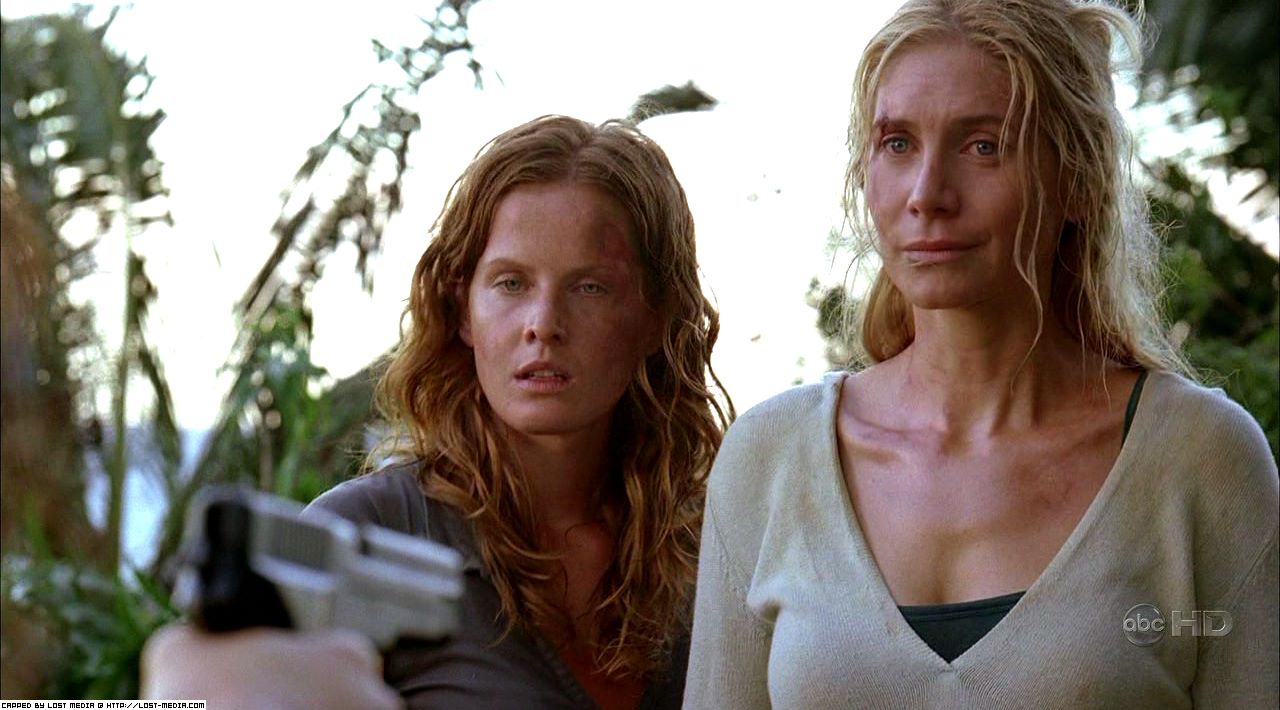 | | Decisions, decisions... |
Every season has its ups and downs, but no season has had them as close together as season four. “Eggtown,” which is a pretty awful episode in its own right, is followed by “The Constant,” which may or may not be in the top five best episodes, which is in turn followed by this entry, “The Other Woman.”
I’ve already confessed my exhaustion with the character of Juliet, around whom “The Other Woman” centers, but that’s not the main reason this episode is here. The main reason is the long string of convenient and seemingly shoe-horned plot devices that make up the narrative. First, there’s the introduction of Harper, a heretofore unmentioned other who was the heretofore unmentioned wife of Goodwin, may he rest in peace. She informs Juliet that Faraday and Charlotte are on their way to the heretofore unmentioned Tempest station and that Ben has apparently decided for no good reason that Juliet is the only one who can stop them.
Faraday and Charlotte are unnecessarily skittish and weird, especially upon the arrival of Kate, whom Charlotte clocks over the head. How Kate, who was going from the barracks to the beach camp, came across Faraday and Charlotte, who were going from the beach camp to the Tempest, is never explained. Then, at the Tempest station, Juliet dukes it out with Charlotte while Daniel makes the island-killing gas inert by means of a ridiculous, unexplained, and cliché clock ticking down to zero. Afterwards, everybody is friends again and Jack, for no readily obvious reason, kisses Juliet.
In flashbacks, we are given some really good scenes with Ben, we are reminded of how megalomaniacal he is, and his relationship with Juliet is more thoroughly explained. Additionally, it is further shown that Ben probably sent Goodwin to his death out of sheer jealousy. Unfortunately, while this is all well and good, it seems like outdated information that is hardly relevant anymore.
"Eggtown"
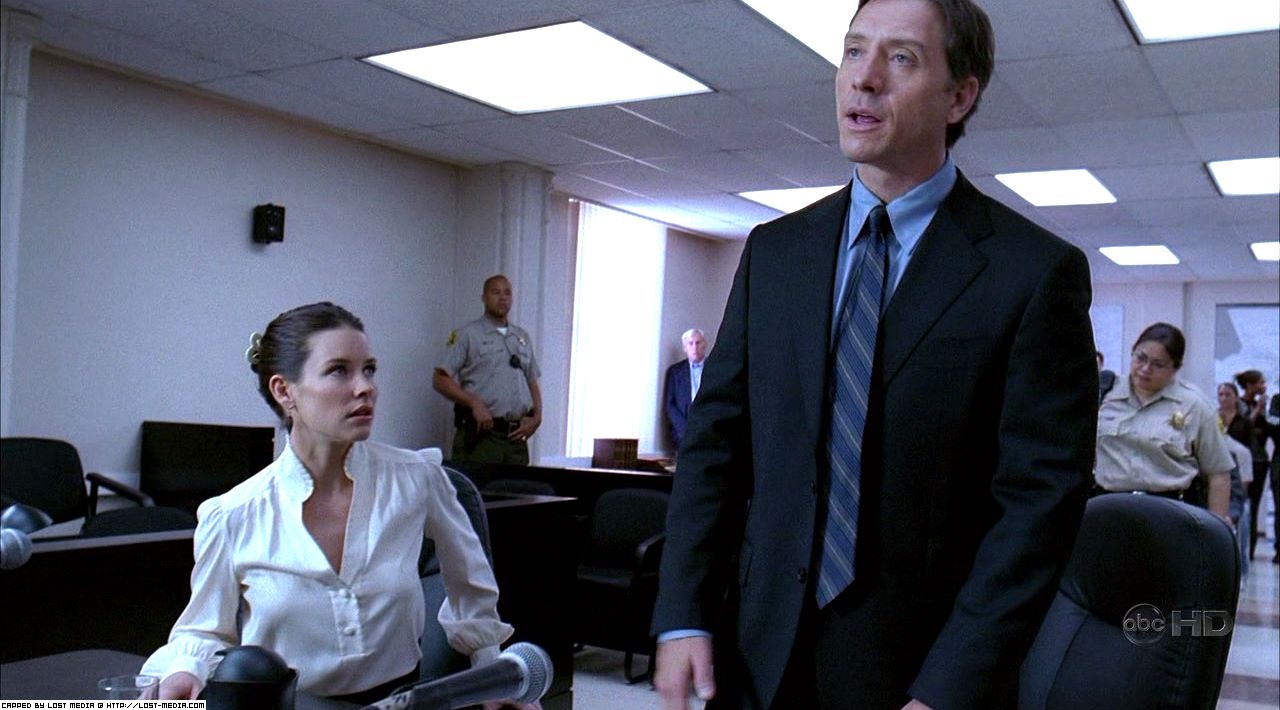 | | "I know she's a murdering, bank-robbing fugitive, but can't we just cut her a break, your honor?" |
Still, even with all of those complaints, “The Other Woman” is not the most underwhelming episode of the current season. That honor goes to “Eggtown,” the Kate-centered episode that preceded it.
The island portion of “Eggtown” involves Kate, after sharing tea with a giddily unmournful Claire, using Sawyer to con Locke so that she can give Miles a minute alone with Ben so that Miles can tell her that he knows she’s a fugitive from the law. She then uses this knowledge to justify spending one more night with Sawyer before deciding to hate him and going back to the beach to be rescued anyway. Kate is overly emotional and retarded throughout, and her motivation, while it might make sense from a certain “woman on her period” point of view, does not justify this waste of an episode. (Yeah, maybe I sound like a mysoginist pig, but she hints none-too-subtly that she is, in fact, on her period during this episode.)
And the flashes only make it worse. We discover that in the future, despite Kate’s laundry list of crimes, she is tried just once, in a state where not a single one of her crimes occurred. Apparently, though she blew up her father’s house with him inside, conspired to rob a bank, was involved in a car chase with the police in which a doctor was killed, was married under a false name to a cop whom she drugged, and committed multiple counts of fraud, the only witness the prosecution can come up with is her dying mother, who decides to suddenly grow a heart because Jack lies on the stand about her being a hero. With their star witness gone, the prosecution can only cut a deal where Kate is forced to stay put rather than face a single day of jail time or pay a single penny. While I can appreciate the irony of Kate, who was born to run, agreeing to stay put, the whole thing insults the intelligence of everybody watching.
Ultimately, the episode’s only purpose is to tie up Kate’s story in a pathetic little bow before shocking us with the revelation that her “son” is the future is none other than little Aaron. However, it is done so sloppily that even the twist at the end can’t salvage this poorly written episode.
"Stranger in a Strange Land"
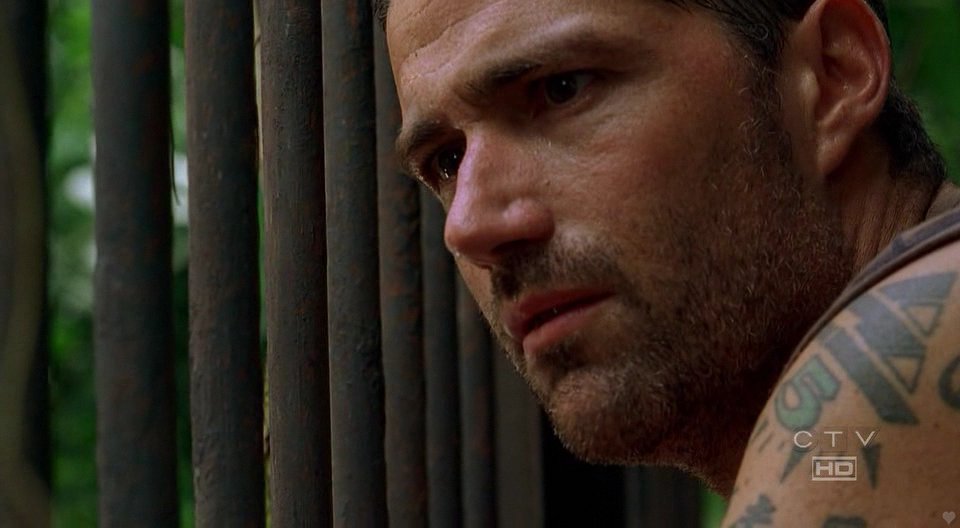 | | You see, he doesn't belong, because he's a stranger, and he's in a strange land. Get it? Oh, in that case, check out his tattoes, which say he's a stranger, and he's in a strange land. Oh, it's just so poetic! |
The third season of Lost has many problems, most of which stem from the fact that the writers were still negotiating over whether or not they could set an end date for the show. With that up in the air, they weren’t sure how much they could progress the story, so, during much of the first half of the season, they were in a kind of holding pattern, which means the episodes they wrote move slowly and methodically.
And many people in the audience who were on the fence about the show at that point became so frustrated they stopped watching. Even I voiced some complaints, and they erupted from me in a blog post following the episode “Stranger in a Strange Land.”
The flashbacks detail Jack’s time in Phuket, where he got some tattoes. Despite trying to make the story intriguing, the writers couldn’t hide the fact that this was the only mystery they were addressing. Jack’s backstory had been told, but many people wondered about his time in Phuket, hinted at earlier in the season, and about how he got his tattoes, which was teased early in season one. The writers framed an “anvilicious” theme about Jack being among strangers, but it is hardly a rivetting tale. Ultimately, the weak story and tiny mysteries don’t make for any mind-blowing revelations or character dynamics.
And the main story of the episode deals with Kate and Sawyer making their way back to the beach while Jack and Juliet are at the Hydra station. This aired shortly after the 6-episode block at the start of the season, and fans were horribly impatient to get back to the people at the beach. While “Flashes Before Your Eyes,” the Desmond-centric episode that preceeded “Stranger in a Strange Land,” is a fantastic episode that deals with people back at the beach, this was still too soon to devote more time to Jack, Kate, Sawyer, and the Hydra station. It was also too soon to introduce yet another other, Isabel, who would never be seen again.
The worst sin, however, was allowing the promotional department to promise, when promoting the episode, that three major questions would be answered. This got many people excited, especially when the promos showed the missing-in-action Cindy, but once the episode was over, these fans—myself included—were scratching their heads trying to figure out what three major questions the promos had been talking about. While I am not one of these fans who thinks every episode has to be a revelation, I do think that promises like that shouldn’t be made before one of the slowest-moving and least revelatory episodes in the show’s entire history.
Top 5 Most Underappreciated Episodes
I'm often in awe of how it can become popular, even among fans, to hate something. Star Wars fans hate Episode I, Star Trek fans hate Enterprise, and Lost fans hate certain episodes of their favorite show, even though the things being hated on may deserve a little more respect. These are the episodes that I personally think fall victim to this phenomenon. While I think they're great episodes, many fans cry out that they suck and I'm stupid for liking them. Of course, they won't back up their opinion, but I will.
"Fire + Water"
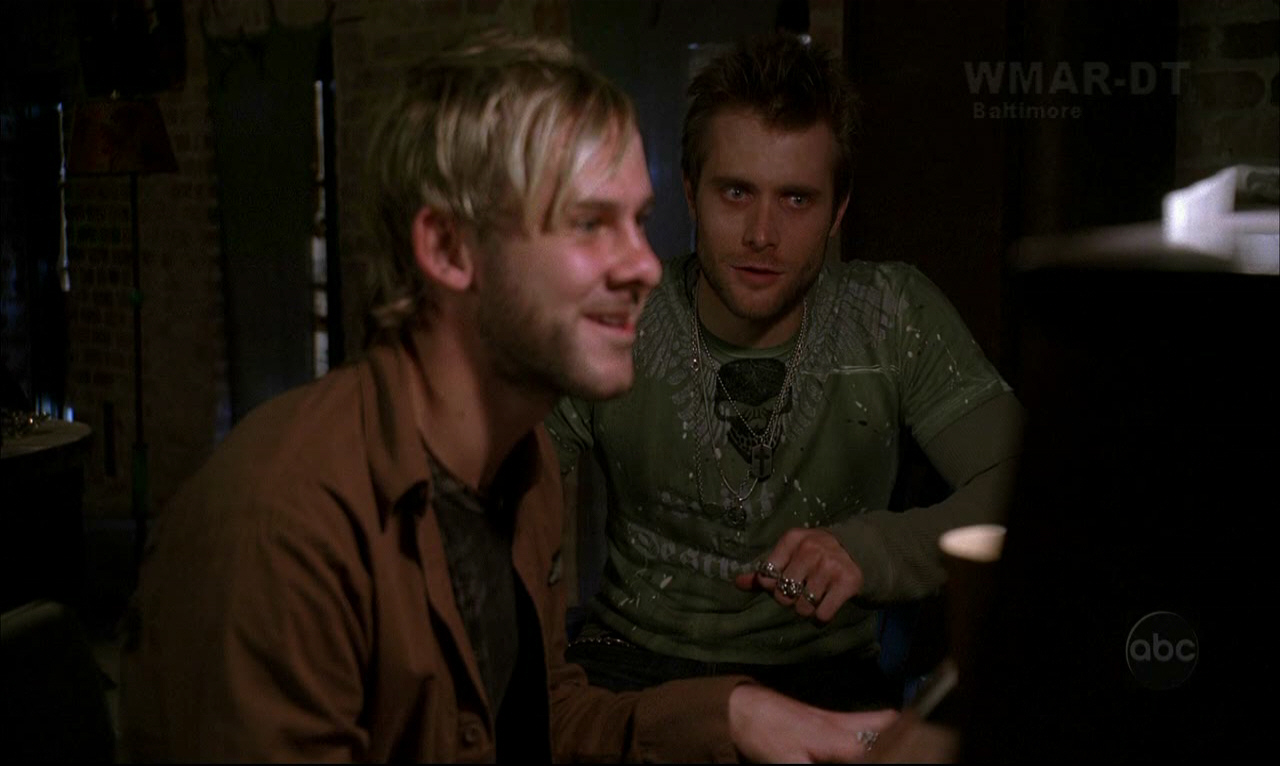 | | This episode had some truly memorable scenes that have apparently been forgotten by many |
Before his beautifully executed death, it was popular to hate Charlie. His character wasn’t a deep one, and some viewers found him whiny and annoying. I can appreciate where these complaints are coming from, though I do not share them. I was never a “bloody rock god” or a heroin addict, but I was once the lead singer in a (tiny local) band and did have a (short) bout of drug use in my youth, so I find Charlie’s story relatable at least. Besides, I think Dominic Monaghan, who plays Charlie, is a really good actor, and it’s not just because he made a good hobbit.
In short, I think Charlie was a human character. His second season episode, “Fire + Water,” often tops the lists of least popular episodes, but I think it’s a rivetting story of a man on the brink of madness, the persistance of addiction, and the need for spiritual acceptance. It’s a telling turning point for Charlie’s character, as well as Locke’s, and it sets up some truly memorable moments later in the season.
Charlie’s story is one of redemption, and “Fire + Water” is a necessary reminder of how hard one has to fight for it.
"S.O.S."
 | | How can you say no to that face? |
Rose and Bernard are popular characters, but their sole flashback episode, “S.O.S.,” is usually listed right alongside “Fire + Water” as one of the worst episodes of the show. I simply do not understand this.
I think many fans dislike episodes that center more on character than on addressing the mysteries of the island, and “S.O.S.” is just such an episode. It is about Bernard striving to make everything right so that he can live happily, and about how Rose keeps trying to show him that it’s often better and more rewarding to accept the way things are. Rose, who was dying of cancer before coming to the island, has made her peace with death, but Bernard wants to fight it with everything he’s got.
Sure, these points are made in the episode with a sledgehammer, but I find them no less poignant because of it. Bernard is probably the most realistically drawn character on the show, and as an everyman, it takes a lot to get through to him. His desperation pushes people away, but when Rose understands and apologizes for being the cause of it, it’s a heartwarming portrayal of a good marriage.
“Exposé”
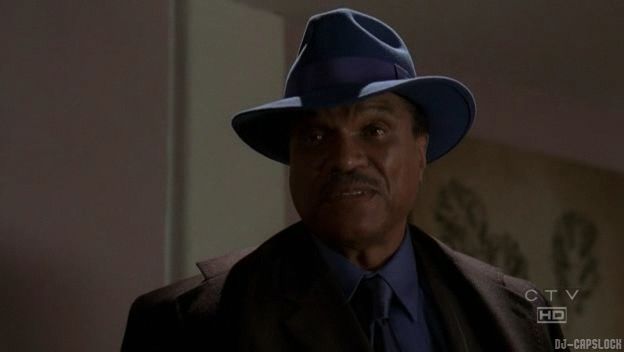 | | "Why you slimy, double-crossing, no-good swindler..." |
Personally, I think “Exposé” would be a legendary episode near the top of everybody’s “best of” list, if only Nikki and Paolo hadn’t been introduced earlier in the season. Unfortunately, if Nikki and Paolo hadn’t invaded the show already, “Exposé” wouldn’t have ended the way it did.
There are several good moments in the episode, along with a handful of small-but-noteworthy revelations. However, I think some of the best moments in the episode can only be seen as bonus features, as they were cut out of the episode. These moments humanize and give dimension to Nikki and Paolo, which is probably why they wound up on the cutting room floor.
While there is no broad thematic point made in “Exposé,” I think it is still a touchingly sad story about how greed and a lack of trust can ruin human interaction and human relationships. Paolo lying about the diamonds—and Nikki’s subsequent discovery of them—illustrates this, but so do the side stories in which Sawyer executes another con and in which Charlie confesses to Sun that he was the one who attacked her back in the second season. Besides, any episode where we get to see a lot of cleavage and more of Artz (though not more of Artz’ cleavage) is a good episode in my book.
All in all, I think most people would really enjoy “Exposé,” if only they could forget how much they hated Nikki and Paolo.
"Ji Yeon"
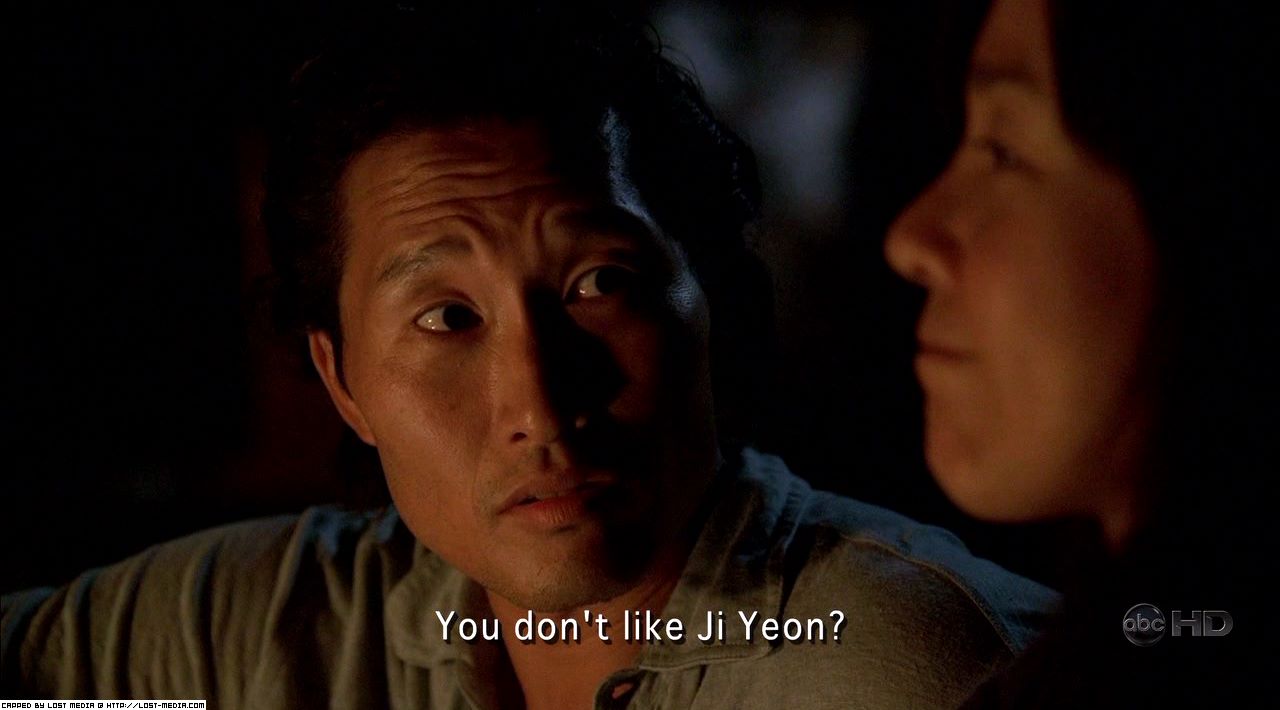 | | Took the words right out of my mouth |
The most recent episode in any of today’s lists, “Ji Yeon” is also the most divisive. I’ve heard opinions across the spectrum about it, and the lynchpin, it seems, is how one reacts to the narrative trickery. We are given the impression that Jin and Sun are both being given a flashforward and that they’ve gotten off the island. We see Jin going pretty psychotic to acquire a gift before getting to the hospital for a birth, and we see Sun in the hospital, giving birth.
Of course, it turns out that the Jin part of the story is actually a flashback, and when Jin gets to the hospital, we find out he’s delivering the gift for Mr. Paik and that he’s only been married a few months. In the future, we see that Jin is apparently dead, and that Sun is alone when she has her baby.
The biggest complaint from haters of this episode is that Jin’s flashback serves no purpose other than to fool the audience. I very strongly disagree. On the island, Jin is attempting to rectify his newfound knowledge that Sun slept with another man back in Korea. His flashback shows that he was so driven by his work for Mr. Paik that the human element of it took a back seat, so it helped him understand why Sun would be driven into the arms of another man.
It’s a subtle point, but worth highlighting. Jin was so obsessed with getting the panda bear, not out of a geniune joy at the celebration of birth or out of the selfless desire to give a present to somebody at one of the happiest crossroads in life, but because it was his job. Money was unimportant, and his quest became such an obsession that he was losing his temper, breaking things, and being overly belligerent to anybody getting in his way. The moment that brings the message home is when Jin, at the hospital, has delivered the gift and allows himself a single, brief moment to look in at the new mother and her baby.
You can see it in his eyes, that desire to be a father with a loving family, but he’s obviously been forced to repress it. This is what Jin is remembering, and it is what allows him, on the island, to forgive Sun. Therefore, while the flashback doesn’t really show us anything we don’t know, I think it is very important in understanding Jin’s state of mind.
Further, the rest of the episode is so darn good. From Juliet’s shocking revelation to Bernard’s rather obtuse but stirring talk of karma, Jin’s story is poignant. Sun’s panic at the true motives of the freighties is important, because it shows that people are starting to really question what’s going on, and her decisions, both emotional and eventually logical, make perfect sense. Even Juliet, who is hard to forgive for manipulating people with information (maybe she and Ben are more of a match than she thinks), is understandable. And, on the freighter, we meet Captain Gault and are given an alternative explanation for the fake 815 wreckage that has weighty repercussions for the show, not to mention the unsurprising moment when we finally get to see Michael again. And finally, it is hard to watch the closing moments of Sun’s flashforward with a dry eye. I may have come to hate Sun’s character for what she’s done to Jin, but seeing her at his grave with his baby can melt the heart of almost anyone.
"Adrift"
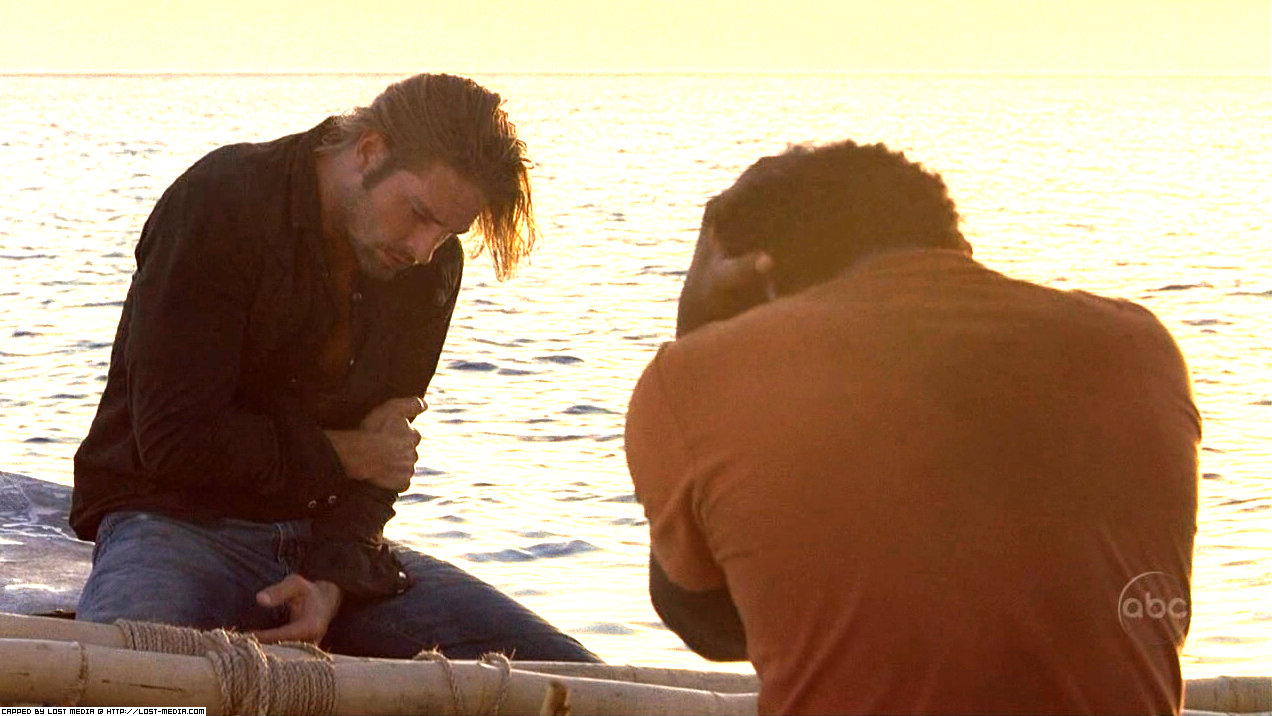 | | They're not only Adrift; they're Lost |
The most underappreciated episode has a lot in common with “Ji Yeon.” Like “Ji Yeon,” it doesn’t really move the story along that much, and the emotional weight of the episode relies on a subtle theme.
Michael’s flashbacks in the second season’s “Adrift” don’t appear to offer anything new. We see how Michael gave up Walt during a legal battle with Walt’s mother, but it was after we’d already seen events before and after it. In short, it doesn’t feel like it adds anything to Michael’s story, but if one looks carefully enough, it does.
Michael is forced during the flashback to come to grips with an unfortunate reality. Sometimes, when we love someone, it’s hard to know if it’s right to let them go. Susan convinces Michael that the only reason he wants to keep Walt is out of selfishness, and Michael relents because he wants the best for Walt and realizes that his desire to hold on might hurt Walt in the long run.
This is a crucial message, because on the wreckage of the raft, Michael realizes he’s made the same mistake. He realizes that, by putting Walt on the raft with him for selfish reasons, he put Walt in harm’s way and shares some responsibility for what happened. He spends most of the episode trying to put the blame on Sawyer, who actually acted with a surprising amount of selflessness to try to rescue Walt, but eventually Michael comes to grips with the truth and breaks down in regret. It’s an important moment for Michael, because it starts him on the journey of desperation that will define him from then on.
Perhaps this point is simply too subtle for most, and combined with the fact that “Adrift” interrupts two highly revelatory episodes about the hatch, that’s why it is usually cited as a bad episode. However, I think it’s one of the most poignant episodes, brilliant in how much it doesn’t try to sledgehammer its point.
Top 5 Best Episodes
Okay. Enough foreplay. Here are my picks for the five best episodes of Lost. This list represents five of the finest hours in television (actually, it’s eight hours), and I dare anybody to watch these episodes and convince me Lost isn’t something special.
"Live Together, Die Alone"
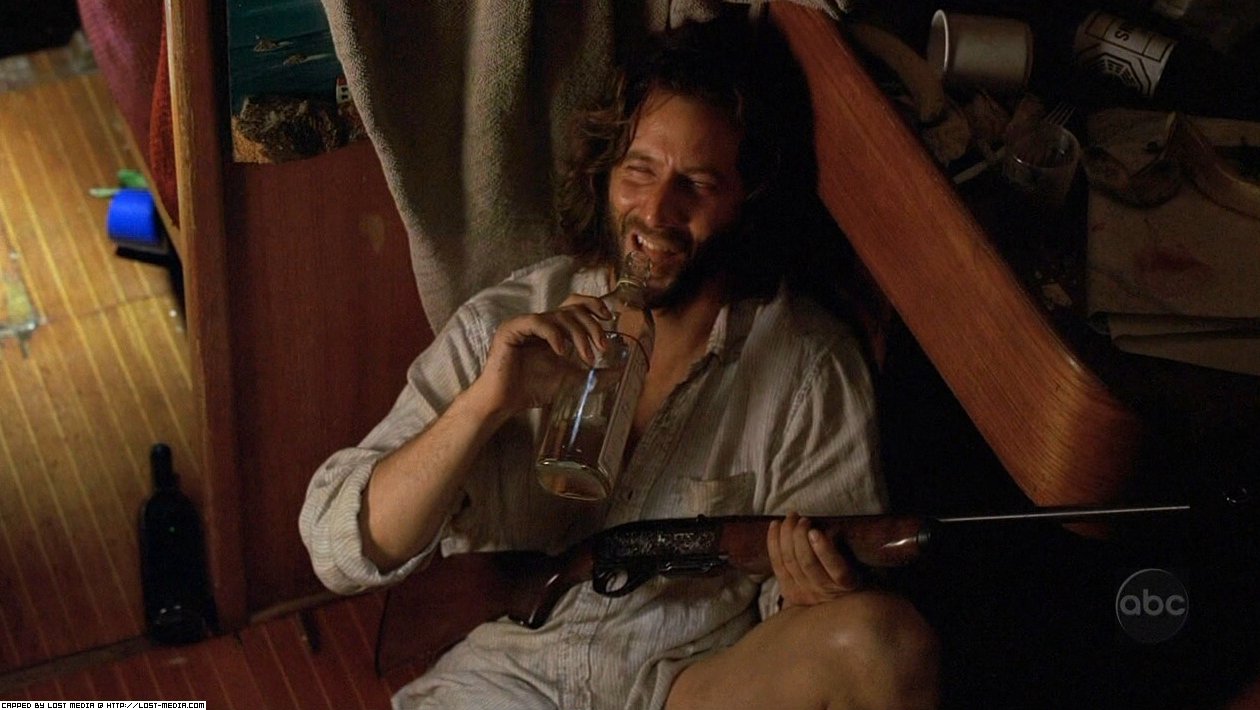 | | Desmond sure knows how to party |
It’s no coincidence that two of the episodes on this list are season finales. The writers always bring their A game to the final moments of the season, and there’s usually a lot to digest. This bodes well for the show’s immediate future, since season four’s finale is a whopping three hours long, but it also highlights a few of the show’s finest moments to date.
“Live Together, Die Alone” is the two-hour finale for season two. It finally wraps up the main plot device of the season—the hatch—by showing what happens when the counter reaches zero, and it answers a few major questions in the show’s mythology; namely, what caused the crash of Oceanic Flight 815 and is the outside world still out there. Michael and Walt leave the island, Jack, Kate, and Sawyer are captured by the others, Locke has his faith restored by being wrong, the hatch explodes (erm, implodes?), we are given our first critical Desmond flashbacks, and we see that, somewhere out in the real world, two guys notice the electromagnetic explosion and call up none other than Penelope Widmore to tell her about it.
If that’s not a masterful season finale, I don’t know what is. (Actually, I do, but I'll get to that later.)
"The 23rd Psalm"
 | | That's some serious second-hand smoke |
Nearly all of the characters on Lost are enigmatic when they first appear, but none so much as Mr. Eko. He seems wise, spiritual, and contemplative, but he is also capable of brutal violence and domination. Therefore, when we are finally given a set of flashbacks for him in “The 23rd Psalm,” it shouldn’t be too surprising that he is a Nigerian warlord-turned-priest. It shouldn’t be surprising, but it is.
From his first act as a child of shooting an old man so that his younger brother, Yemi, doesn’t have to, we see how Eko’s life has been driven by a singular sacrifice. We see him at his most merciless and calculating later in life, and we see how Yemi eventually returns Eko’s childhood favor by sacrificing himself so that Eko may gain redemption.
“The 23rd Psalm” is unabashedly religious, and that takes guts nowadays. Lost once again shows its willingness to explore all ideas of faith and philosophy, and refuses to pull any punches. Eko’s backstory is chock-full of Christian ideals, and the on-island story has plenty of parallels. When Charlie attempts to justify himself to Eko, it’s almost as if he’s trying to justify his actions to God himself, and even Charlie can’t keep up the act for too long.
But there’s more to the episode than even the religious overtones. There are some amazing moments, like Eko facing off with the smoke monster, and some of the finest examples of filmmaking talent on the show. Not only is Hawaii turned into a convincing Nigeria, but the musical score in this episode is one of the best in the entire series.
"The Constant"
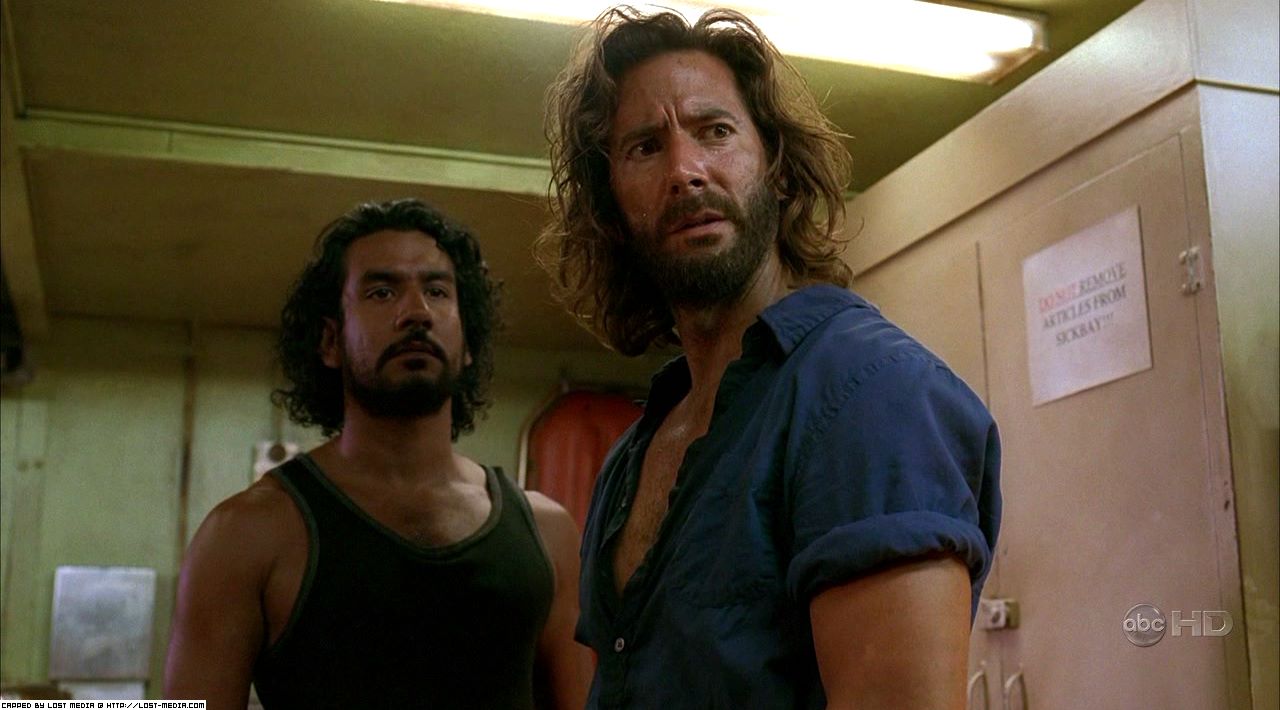 | | Women everywhere swoon while the guys get all excited by time travel |
This season’s “The Constant” became an instant favorite after it aired a couple of short months ago. It tells the story of Desmond, who after managing to get off the island, finds himself inexplicably leaping through time.
Not only does the episode give us direct clues about the mythology of the show and the nature of what’s really going on, but it tells a moving story of love against all odds that is never too cheesy. I could gush for pages about how great this episode is and how fantastic Henry Ian Cusick is as Desmond, but sufficed to say, episodes like “The Constant” are enough to justify my devoting so much time to this show.
"Pilot"
 | | Yep, that's the pilot all right... |
With a budget of anywhere between $10 and $14 million, the two-part pilot episode of Lost is by far the most expensive pilot in television history. And if you ask me (or ABC for that matter), it’s money well spent.
The pilot episode is shocking, mesmerizing, exciting, dramatic, touching, and fascinating. In short, it’s everything you need to get hooked on the show. It’s also crammed full of information, so much so that there are people out there right now who still analyze it for unnoticed clues.
There’s really not a whole lot more I can say on the subject. It’s just a damn good episode.
"Through the Looking Glass"
 | | No, this isn't the start of a porno |
In a single two-hour episode, the showrunners managed to create at least a dozen of the most memorable moments in all of Lost. Whether it’s Jack’s shocking flashforward meeting with Kate, Locke’s revival at the feet of taller ghost Walt, Hurley storming the beach in the Dharma van, Sayid killing a guy with just his feet, Charlie’s poetic death, the revelation that it’s not Penny’s boat, the call for rescue, Naomi’s (first) death, Rose’s line about punching Jack in the face, or just the rage with which Jack bashed Ben’s head in, the episode had several important scenes.
There were plenty of game-changing revelations, character evolutions, and story progressions. Additionally, there was a new storytelling technique introduced, a new big mystery to address, and a whole lot of exciting action. To put it simply, “Through the Looking Glass” is Lost at its absolute best.
-e. magill 04/21/2008
Check out the other installments:
| PART 1: | Mysteries
WTF Moments
Most Shocking Moments |
| PART 3: | Least Fave Minor Characters
Least Fave Major Characters
Favorite Minor Characters
Favorite Major Characters |
|
|
|